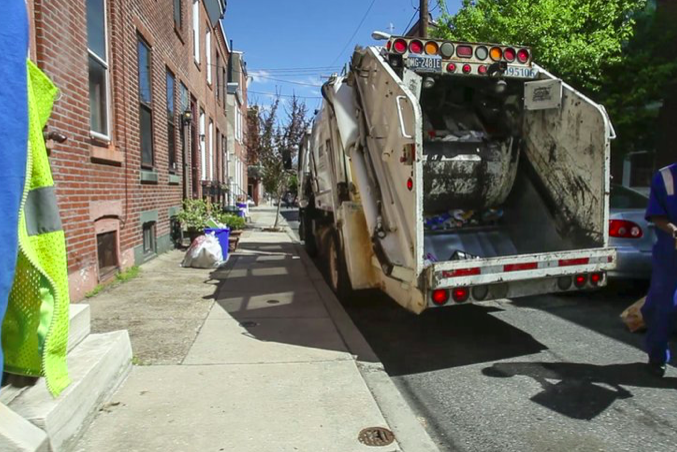
April 02, 2020
 Thom Carroll/for PhillyVoice
Thom Carroll/for PhillyVoice
The Philadelphia Streets Department is operating a day behind schedule for trash and recycling collection as a result of staffing shortages during the coronavirus pandemic. Residents should expect delays and maintain normal curbside schedules as the department catches up.
Recycling collection in Philadelphia will begin occurring every other week during the coronavirus pandemic, Managing Director Brian Abernathy announced Friday.
Residents should withhold putting out their recycling during the week of Monday, April 6. Recycling will resume on its new schedule beginning the week of Monday, April 13. Trash collection will continue on its regularly weekly schedule, though some delays may occur.
On Thursday, city officials first instructed residents to expect some delays in trash collection due to staffing shortages in the city's Streets Department.
Mayor Jim Kenney tweeted that the city is running about a day behind for trash and recycling collection. Residents should continue to place trash in its normal place on their regular scheduled days for collection.
Our @PhilaStreets team is working hard, but we are running about a day behind for trash and recycling collection.
— Jim Kenney (@PhillyMayor) April 2, 2020
If your trash is not picked up, please leave it in its normal spot. And continue to put out your trash on your scheduled day.
Thank you for your patience. pic.twitter.com/JeJdg6zqE3
"We've had some staff shortages as it relates to sanitation," Abernathy said Thursday. "We're working with the union to make sure that's rectified. We're doing our best make sure that all of our core city services are provided. We're running a little bit behind on trash pickup, but I'm confident that we're going to catch up."
The Streets Department is expected to work into this coming weekend to try to get caught up on collection.
During the first 11 days of the coronavirus restrictions in Philadelphia, essential workers including those in sanitation received 150% pay for the risks entailed in their jobs. That period ended March 29 and the city currently is negotiating short-term contracts with some unions, officials said.
As a policy, the city has not been providing numbers of workers who have tested positive for COVID-19.
City Council President Darrell Clarke and Mayor Kenney jointly announced the passage of a bill approving $85.4 million in COVID-19 relief, which will be used to cover testing sites and supplies, leasing for quarantine and isolation space, personal protective equipment, and the maintenance of the city's core services, including those relied upon by vulnerable residents.
“The crisis we are facing brought on by the coronavirus pandemic is unprecedented," Clarke said. "Every part of our economy is going to feel the impact of these months of sheltering-in-place. Just as the stimulus plan at the federal level is believed to be the first of many steps on a long road to our nation’s recovery, what Council voted on and approved today is just the beginning of what we will need to do to help our residents, small businesses, and other organizations rebuild after this pandemic.”
Philadelphia Health Commissioner Dr. Thomas Farley announced 425 new cases of COVID-19 reported on Thursday, including two new deaths, bringing the city's total to 17.
Among the positive cases, about 50% are people under the age of 50 years old, though the majority of fatalities are older residents.
Nine of the city's victims have been residents of nursing homes.
“The crisis we are facing brought on by the coronavirus pandemic is unprecedented. Every part of our economy is going to feel the impact of these months of sheltering-in-place. Just as the stimulus plan at the federal level is believed to be the first of many steps on a long road to our nation’s recovery, what Council voted on and approved today is just the beginning of what we will need to do to help our residents, small businesses, and other organizations rebuild after this pandemic.”
The city also updated the total number of Philadelphia inmates infected with COVID-19 to 20 on Thursday.
Farley said it is still too soon to determine the impact of the city's social distancing efforts. A week ago, Farley said allowing two to four weeks might begin to give public health officials a better sense of what's happening with the rate of infection.
"It's very hard to predict this," Farley said. "It's too early to say for sure now. There's a delay between when the infection starts to slow down and when people get sick, because there's an incubation period of four to six days. And then there's a delay between when people get sick and when they get tested. There's a delay between when they get tested and when we get the results. That could be several days. It takes quite a while from the time when changes happen out there in the community and when we start to see it in our data."